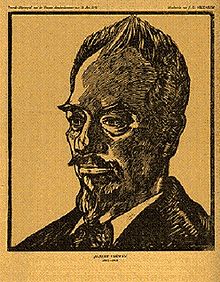
by Jan Veth (1885)

by Jan Veth
Albert Verwey (May 15, 1865 – March 8, 1937) was a Dutch poet belonging to the "Movement of Eighty". As a translator, staffer, and literary historian he played an important role in the literary life of The Netherlands in the late 19th and early 20th centuries.
Verwey was born in the center of Amsterdam; all his life he spoke with a strong local accent. Both his father and grandfather were furniture makers. In his youth, he lost both his parents, caused by tuberculosis. Verwey began to write poetry early in life. In 1880 he translated poems by Samuel Coleridge, Byron, Shelley, and Wordsworth. After finishing high school Verwey worked at a securities office. Because Verwey was very good in English, the 18-years-old Verwey was invited by the Dutch directors of the Maxwell Land Grant to join them as translator to Cimarron, New Mexico. His first book of poems, called Persephone after the Greek goddess, was published in 1883. In 1885 he was a co-founder of the periodical De Nieuwe Gids (“The New Guide”), which was one of the chief organs of the Dutch literary revival of the 1880s. Verwey contributed sonnets and more poems. Verwey was a close friend of Willem Kloos, and an affair developed between the two poets, which is unprecedented in Dutch literature. They broke their relation in 1888. In 1889 he failed his Latin examinations. In the same year, his collected poems were published, with translations of work by Christopher Marlowe.
In 1890 Verwey married and moved to Villa Nova in Noordwijk aan Zee. Frederik van Eeden became his brother-in-law. Verwey was involved in the decoration of the Beurs van Berlage, a "synthesis of the arts". For a time he was influenced by Spinozism and Socialism through his wife. Since 1895 he was connected to the esoteric German poet Stefan George, whose work he translated. In some of his poems, Verwey reflected on the horrors of the World War One; Verwey held Germany responsibly and refused to accept George's later ideas about a spiritual aristocracy. In 1922 his translation of Gulliver's Travels was published. From 1924 till 1935 Verwey was a professor at the Rijksuniversiteit Leiden. Verwey translated and promoted medieval poetry in search of passion, vision, and dreams.
Although no Dutch writer has won the Nobel Prize in Literature he is among the Dutch writers to have been nominated by multiple people. Verwey was a prolific writer; at the University of Amsterdam his carefully kept correspondence (of 20,000 letters) can be consulted.
-
 'Stoa', wall poem in Leiden
'Stoa', wall poem in Leiden
-
 Poem on the Beurs van Berlage, the Amsterdam commodity exchange
Poem on the Beurs van Berlage, the Amsterdam commodity exchange
-
 Grave in Noordwijk
Grave in Noordwijk
-
Bust in Noordwijk
References
- Lansing Bartlett Bloom; Paul A. F. Walter (1979). New Mexico Historical Review. University of New Mexico. pp. 127–128.
- Albert Verwey, dominerend dichter door Martine van Poeteren- 11 februari 2018
- Maurits Uyldert (1948) De jeugd van een dichter – Uit het leven van Albert Verwey
- Web. 30 Nov 2013.
External links
- Works by Albert Verwey at Project Gutenberg
- Works by or about Albert Verwey at the Internet Archive
- Works by Albert Verwey at LibriVox (public domain audiobooks)

- Het Geheugen van Nederland on Verwey
- ‘Twee open deuren op een open verandah’